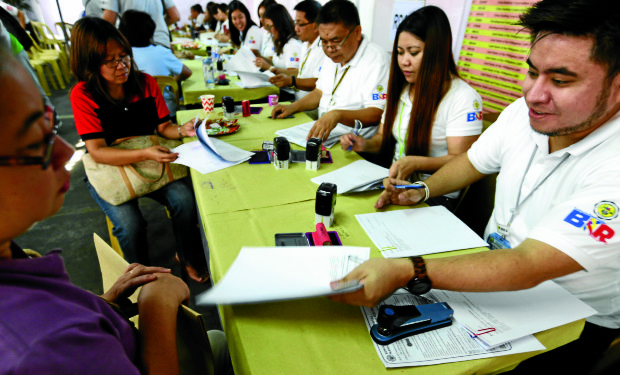BIR collections up 12.2% to P472.9B in Q1

Taxpayers flock to the BIR office along Quezon Avenue in Quezon City for the last day and deadline of filing of income tax. EDWIN BACASMAS
The Bureau of Internal Revenue’s tax take from its operations jumped 12.2 percent to P472.9 billion during the first three months, such that Commissioner Caesar R. Dulay on Monday expressed optimism that the country’s biggest tax collection agency can hit its target for this year.
Dulay told reporters that first-quarter collections jumped from P421.4 billion during the same three-month period last year.
As such, the BIR exceeded its target take from operations for the January to March period of P361.3 billion.
Collections from BIR operations–which include taxes on net income and profits, value-added tax, excise taxes and percentage taxes, among other taxes–account for the bulk or over 90 percent of the agency’s total take.
The agency was also tasked to collect P14.8 billion from non-BIR operations, to bring the total first-quarter target to P376.2 billion. Data on collections from non-BIR operations were not available.
Article continues after this advertisementAsked if the BIR can achieve its P1.829-trillion collections goal for 2017, Dulay said they were “hopeful” to do so.
Article continues after this advertisementDulay noted that between April 1 and 9, or ahead of Monday’s deadline to file income tax returns (ITRs), the BIR collected P11.5 billion, up 19.7 percent from the P9.6 billion during the first nine days of April last year.
For the month of April, the BIR had been programmed to collect over P208 billion–P204.7 billion from operations on top of P3.3 billion from non-operations.
Monthly collections peak in April amid the ITR filing deadline.
To achieve this year’s target, which was equivalent to almost four-fifths of the government’s tax revenue program of P2.313 trillion, Dulay had said that the BIR plans to improve taxpayer compliance through the expansion of its compromise settlement program for audit cases of large taxpayers.
Also among the BIR’s priority programs for 2017 aimed at attaining the collection target include continuous implementation of the Run After Tax Evaders (Rate) as well as “Oplan Kandado” programs; comprehensive taxpayer profiling and industry benchmarking; updating of zonal value schedules; broadening of the tax base without increasing the tax rates by registering unregistered taxpayers/businesses as a result of tax compliance verification drives and third-party information; implementation of centralized arrears management in regional offices; as well as adherence to the cross-border agreements on exchange of information, such as the US’s Foreign Account Tax Compliance Act (Fatca), Dulay had said.
To improve taxpayer satisfaction, Dulay had said that the BIR will continue to review previous revenue issuances and rulings as well as repeal those that impose unnecessary burden on taxpayers and hinder business transactions.
The BIR will also revisit the criteria for classification of taxpayers according to the business size (large/medium/small/micro); simplify tax forms, expand the coverage of electronic filing facilities to include other non-large taxpayers; provide taxpayers additional options or facilities to pay taxes using credit/debit/prepaid cards and mobile payments; development a tax clearance processing system; and enhance the electronic certificate authorizing registration system, official registry book, tax information system, taxpayer registration system, as well as geographical information systems.
To protect revenues and recapture public trust, the BIR this year will put in place an integrity management program that will facilitate removal of corrupt and erring personnel; revalidate/audit tax assessments; propose legislation removing the agency from the Salary Standardization Law (SSL); fast-track the hiring of 996 new staff; and also use a case monitoring system for outstanding letters of authority to facilitate mandatory observance of the audit period as well as track progress of cases, according to Dulay.